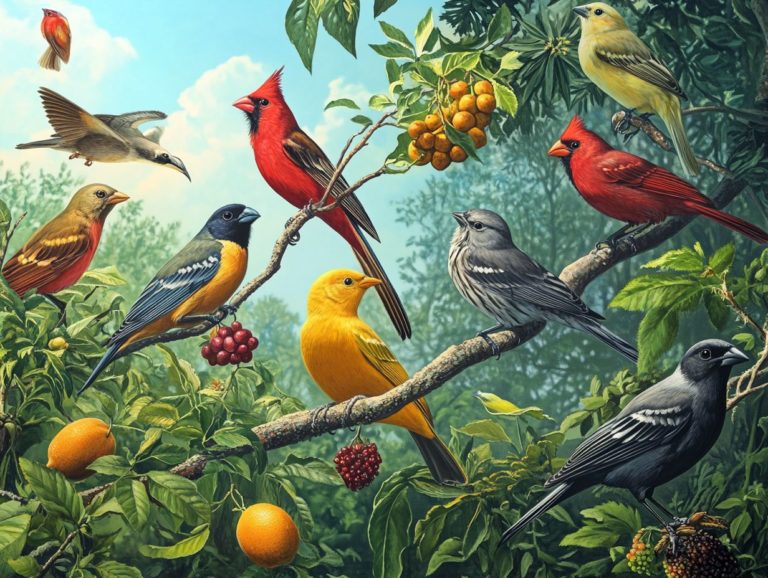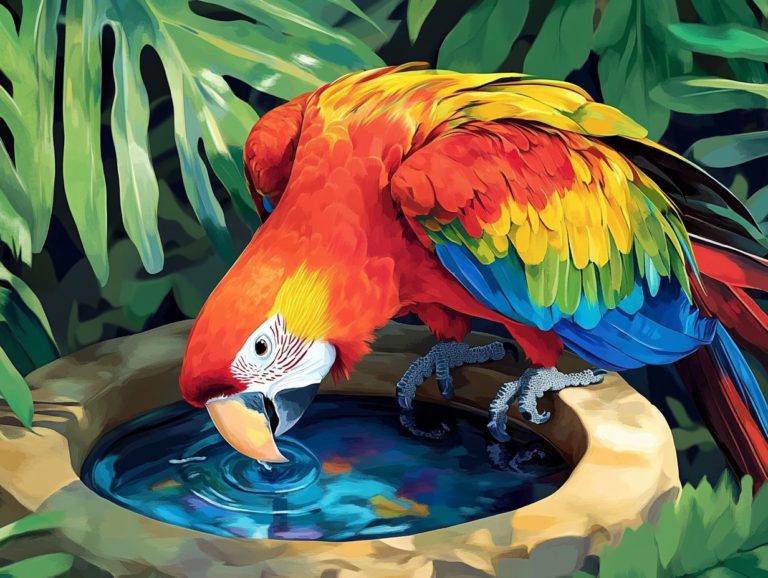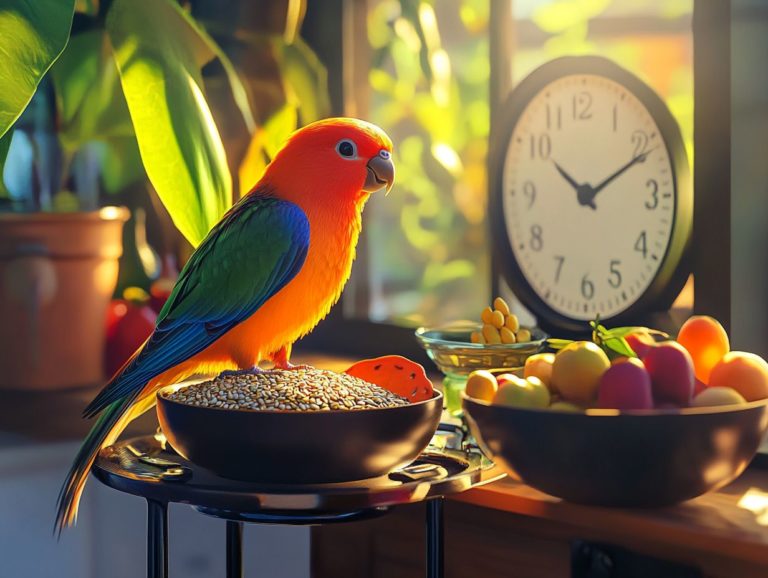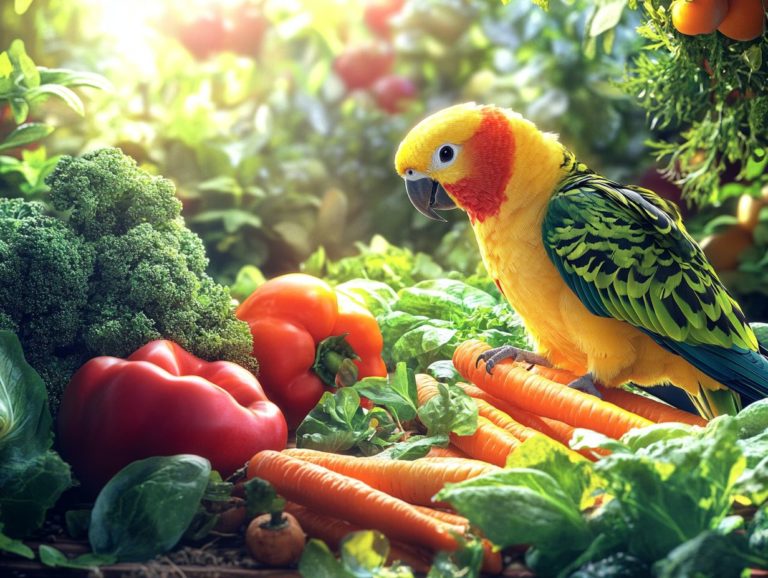The Effects of Malnutrition in Birds
Malnutrition in birds is a pressing issue, known as bird malnutrition. It can profoundly affect their health and well-being. Understanding what malnutrition means and its underlying causes is the crucial first step toward ensuring your feathered companions thrive!
This guide will help you spot signs and symptoms quickly! It explores the potential health complications that can arise and outlines the diagnostic techniques necessary for identification, including regular monitoring of your pet birds. It also discusses effective treatment strategies and preventive measures to promote optimal nutrition for birds.
Whether you re a dedicated pet owner or a passionate bird enthusiast, this information will empower you with the knowledge needed to keep these exquisite creatures healthy and vibrant while meeting their specific nutrition needs!
Contents
Key Takeaways:
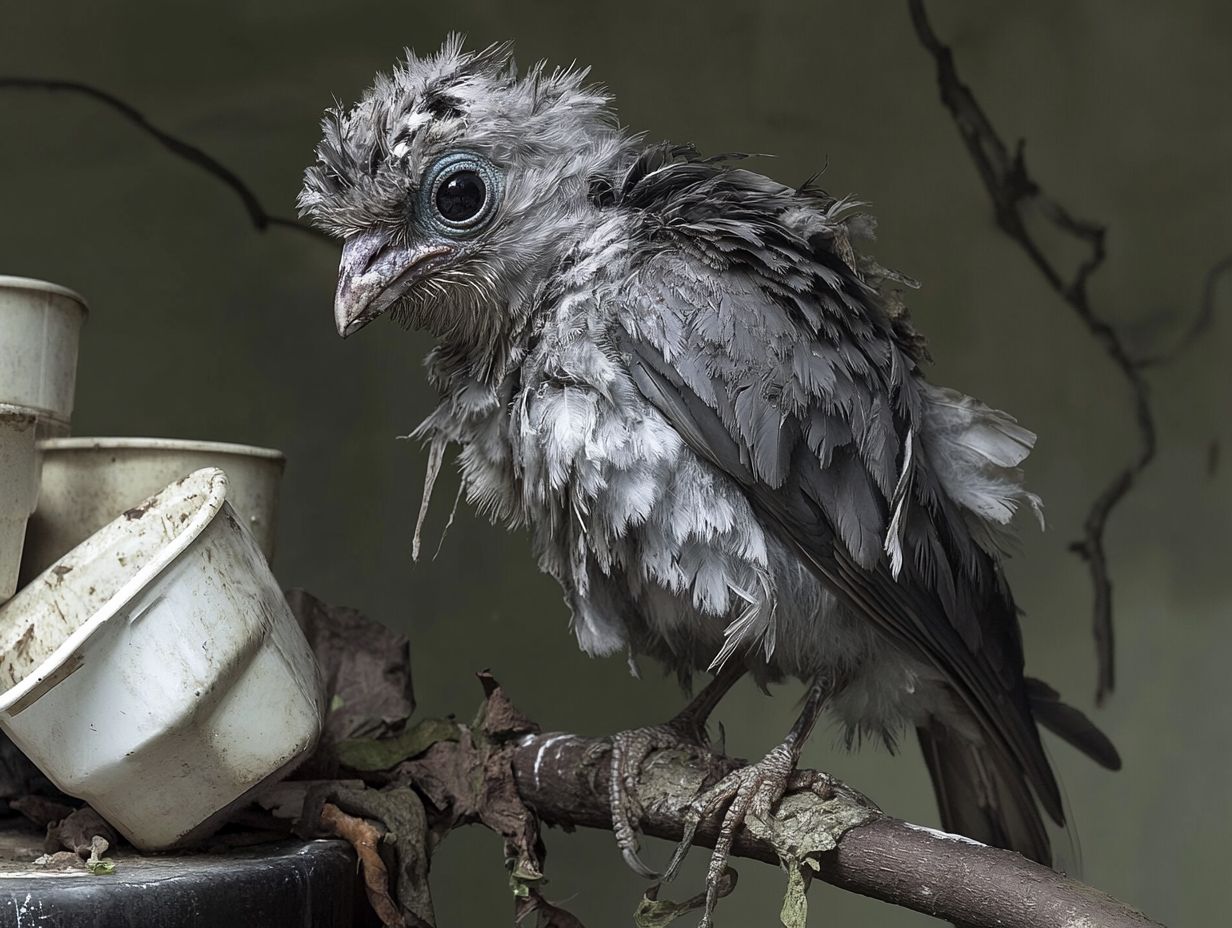
1. Malnutrition in birds is a serious condition caused by a lack of proper nutrients in their diet. This can lead to various health complications, including bird diseases caused by lack of vitamins.
2. Signs and symptoms of malnutrition in birds can include physical changes such as weight loss. Behavioral changes such as decreased energy and appetite are important warning signs.
3. To prevent and treat malnutrition in birds, it is important to provide a balanced diet, maintain hydration, and ensure proper care and attention to their overall health and well-being.
What is Malnutrition in Birds?
Malnutrition means your bird isn’t getting the right nutrients they need to stay healthy! It signifies a deficiency or imbalance in essential nutrients vital for their overall health and well-being. This condition often results from poor feeding habits.
Factors such as a lack of dietary variety and improper feeding habits can lead to malnourished birds. Inadequate access to quality food may also contribute to this issue.
It’s not just a physical health issue; malnutrition can influence behavior, weaken the immune system, and shorten lifespan. As a bird owner, it s crucial to recognize the significance of fulfilling your pet s specific nutritional needs, including vitamins A and D3, to prevent diseases associated with vitamin deficiencies.
Understanding the causes and consequences of bird malnutrition is essential for ensuring the holistic wellness of your avian companions and addressing their dietary needs.
Defining Malnutrition and its Causes
Malnutrition in birds occurs when they fail to receive the essential nutrients required to maintain their health. This can lead to various warning signs, including behavior problems that may indicate serious health issues.
This nutritional shortfall can arise from multiple deficiencies. For instance, insufficient vitamin A can compromise vision and immune function. A lack of vitamin D3 is critical for calcium absorption and skeletal health, highlighting the need for regular veterinary consultations.
Inadequate levels of B complex vitamins affect energy levels and proper nervous system function. Missing essential fatty acids fats that birds need for healthy feathers and energy can adversely affect feather quality and overall vitality.
Many bird owners contribute to these deficiencies without realizing it. Common feeding practices, like relying solely on seed diets, neglect the importance of a species-specific diet. Misleading food myths, such as the notion that avocados are safe or that a single type of pellet can provide balanced nutrition, can exacerbate the situation.
Signs and Symptoms of Malnutrition in Birds
Spotting the signs of malnutrition is crucial! Birds often display warning signs indicative of nutritional deficiencies, such as behavioral changes, poor feather quality, and weight fluctuations. These symptoms are crucial for health monitoring!
As a keen observer, you can spot these symptoms before they develop into more serious health issues. This underscores the importance of maintaining proper hydration and a balanced diet, which includes essential fatty acids, for your feathered friends!
Physical and Behavioral Indicators
Malnutrition in birds can show up in many ways. Look for changes in appearance and behavior.
As their body condition declines, poor feather quality may appear. This includes dullness, breakage, or excessive molting.
Fluctuations in weight are also common. Some birds might lose weight quickly, while others may become obese due to improper diets.
Watch for digestive issues. Irregular droppings and decreased food intake can lead to serious health problems.
Behavioral changes like increased aggression or lethargy may signal stress or health issues that need a vet’s attention.
Ensure your birds are well-hydrated and receive a balanced diet. This is crucial for their overall health and to prevent complications.
Impact of Malnutrition on Bird Health
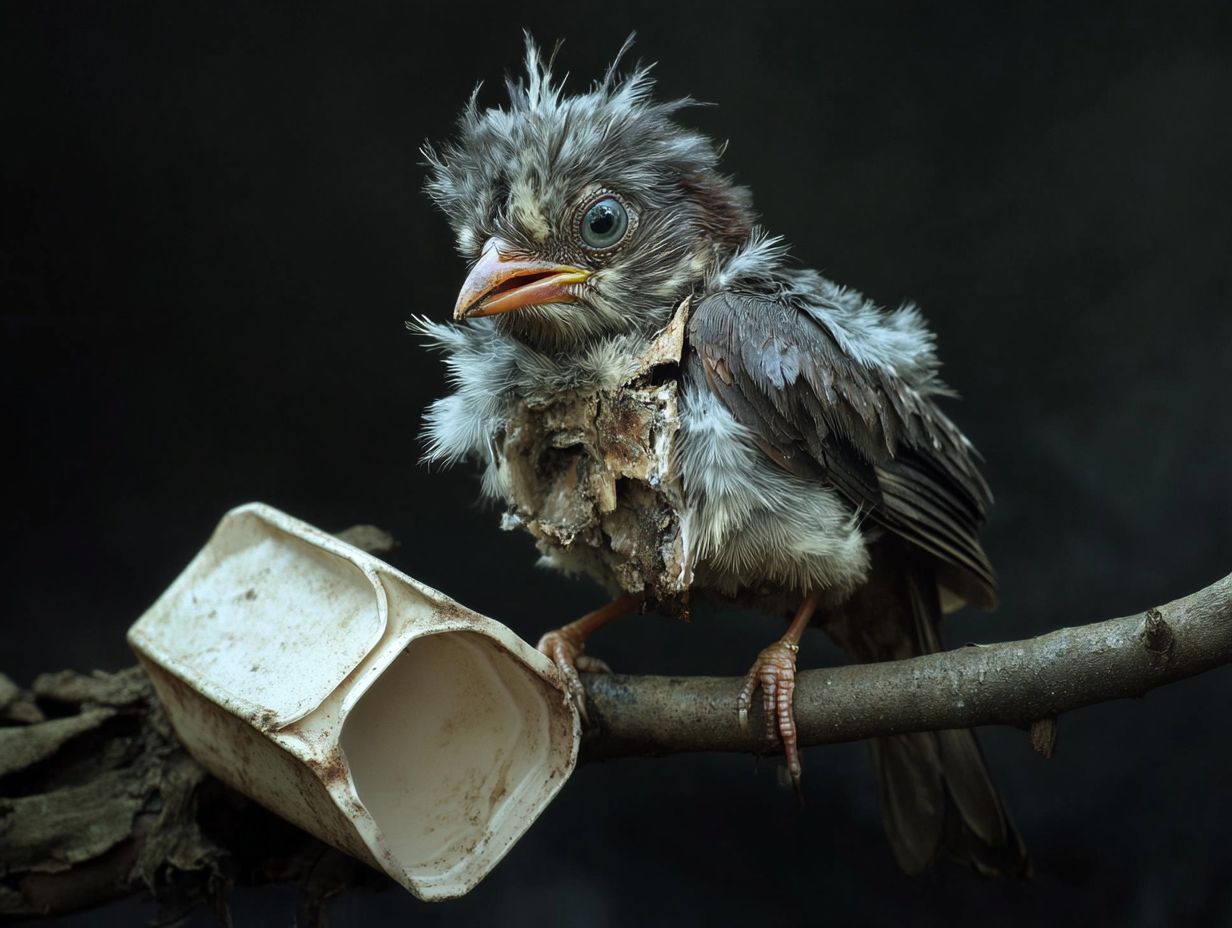
Malnutrition can seriously affect bird health, leading to diseases that weaken their immune system and impact their overall behavior. Understanding the impact of diet on bird behavior is crucial for ensuring their well-being.
Without proper nutrition, birds may face health problems that lower their quality of life. This can even shorten their lifespan.
Understanding the role of vitamins like A and D3, along with dietary supplements, is essential for fostering health improvements. This knowledge is key for any committed bird owner.
Possible Health Complications
Possible health complications from malnutrition encompass a wide range of bird diseases. These are often linked to specific vitamin deficiencies and poor dietary habits.
Digestive problems like bloating and diarrhea can arise due to inadequate fiber and essential nutrients. These issues can also trigger skin conditions.
Skin conditions like feather plucking or dry skin can also develop from a lack of vital fatty acids and other important dietary elements.
Preventing these complications is achievable with the right feeding strategies and nutritional awareness. Ensure a balanced diet rich in varied nutrients, and consult a veterinarian regularly.
Diagnosing Malnutrition in Birds
Diagnosing malnutrition in birds requires a careful look at their physical health and dietary habits. An avian vet typically conducts this evaluation.
This assessment includes various diagnostic techniques such as dietary analysis and tests from an experienced veterinarian.
Diagnostic Techniques and Tests
Bird malnutrition diagnostic techniques include dietary analysis, physical examinations, and laboratory assessments. A skilled avian veterinarian performs these tests.
These evaluations help understand factors affecting your bird’s health. Blood tests identify specific vitamin levels and mineral deficiencies that are essential for diet planning.
By examining dietary intake and lab results, veterinarians can pinpoint nutritional deficiencies and recommend appropriate vitamin supplementation. If your bird lacks vital vitamins like A or D, tailored dietary recommendations can be made.
This personalized approach helps restore your bird s health and guards against future nutritional pitfalls. Ensure your avian companion enjoys a balanced and suitable diet enriched with essential fatty acids!
Treating Malnutrition in Birds
To treat malnutrition, implement nutrition strategies that meet the dietary needs of the specific bird species. Use the avian food pyramid as your guide.
In some cases, dietary supplements may be necessary to address any vitamin deficiencies and ensure comprehensive nutrition for each bird.
Proper Nutrition and Care Strategies
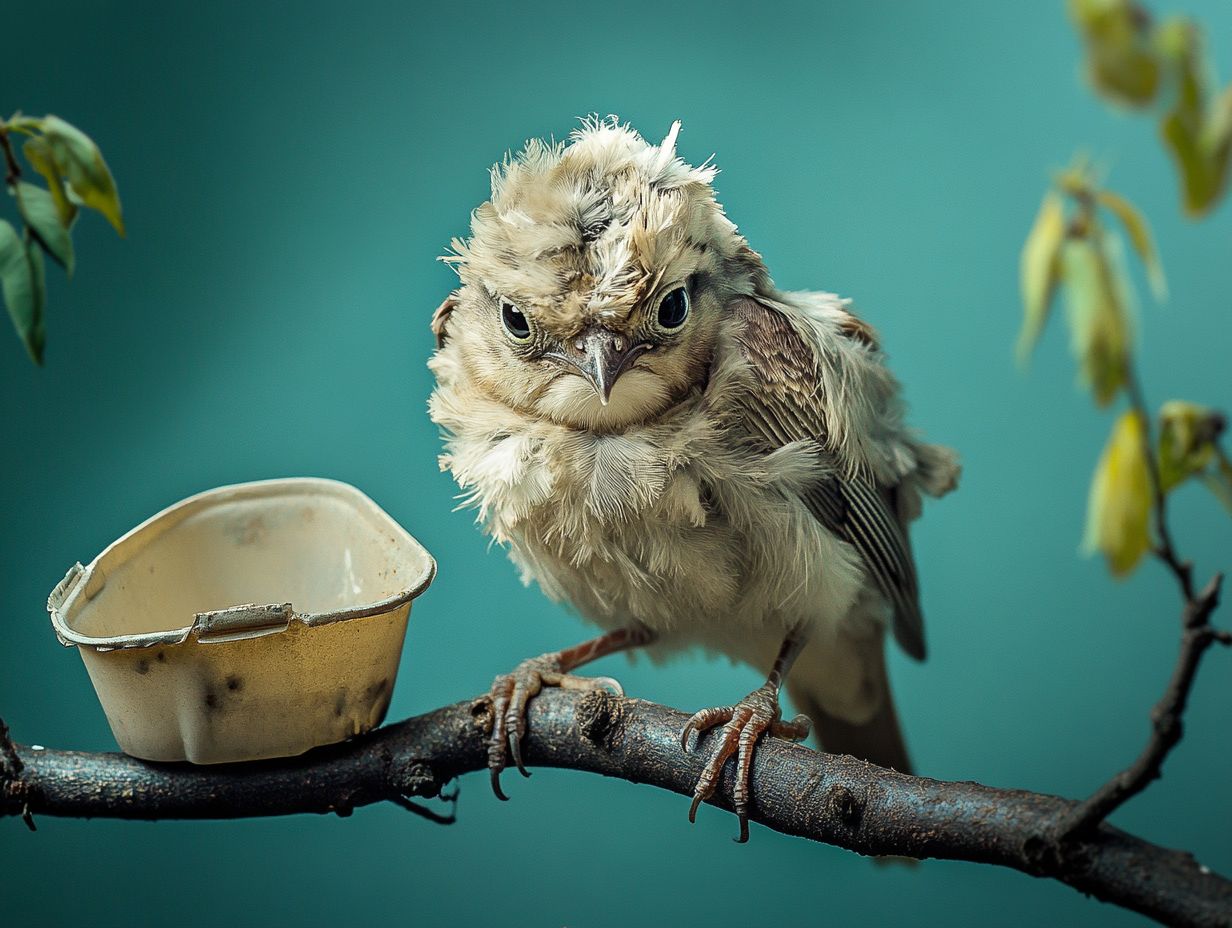
Implementing proper nutrition and care strategies is essential for recovery and maintenance of healthy birds. A balanced diet tailored to their specific needs is crucial.
Use the avian food pyramid to plan varied diets, including seeds, grains, fruits, vegetables, and proteins. This promotes healthy habits and encourages natural foraging behaviors.
Healthy feeding habits, such as offering smaller meals and limiting high-fat treats, boost your birds’ well-being. Over time, these practices improve feather quality and energy levels.
Preventing Malnutrition in Birds
Prevent malnutrition by implementing effective feeding strategies alongside regular health and weight monitoring. Providing adequate environmental enrichment is key for avian wellness.
These measures promote healthy habits and help your feathered companions thrive, reducing the risk of malnutrition.
Best Practices for Bird Care and Nutrition
Best practices for bird care emphasize feeding strategies with diverse foods and integrating environmental enrichment. This enhances bird health.
Craft a species-specific diet plan that meets the unique nutritional needs of different bird species. Include a mix of fresh fruits, vegetables, and high-quality pellets.
Engage your birds with stimulating feeding techniques, like foraging toys and puzzle feeders. These not only make mealtime exciting but also support cognitive health.
A balanced diet is essential for maintaining a healthy, happy avian companion!
Frequently Asked Questions
What is malnutrition in birds?
Bird malnutrition can lead to serious health issues. Address it promptly.
Malnutrition in birds refers to a lack or imbalance of necessary nutrients, causing negative effects on their overall health and development.
What are the effects of malnutrition in birds?
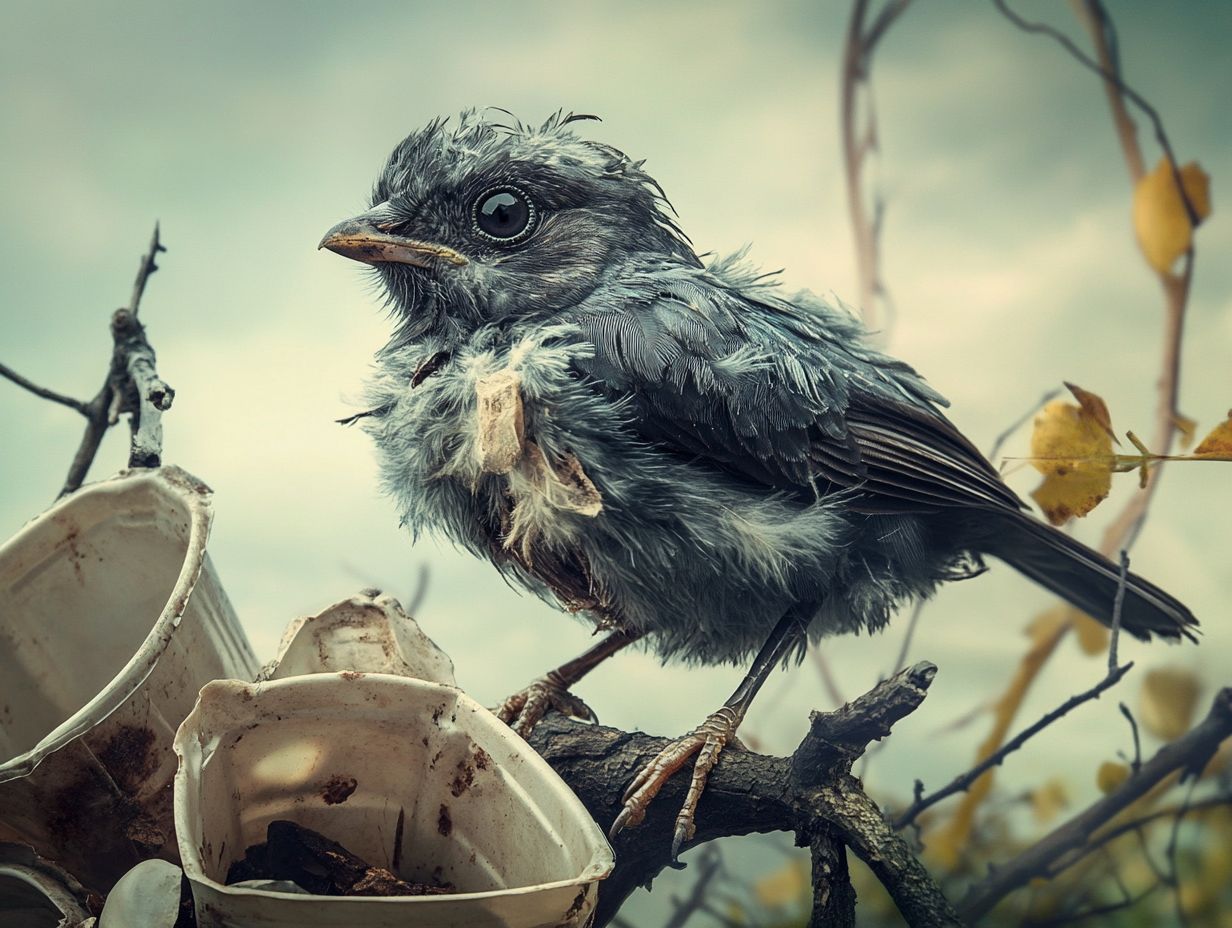
Signs of malnourished birds may include poor feathers and weight loss. These can indicate your bird’s health is at risk!
The effects of malnutrition in birds can range from mild to severe, potentially leading to issues such as stunted growth, a weakened immune system, organ damage, and even death. To prevent these problems, it’s crucial to understand the nutritional needs of aging birds.
What causes malnutrition in birds?
Malnutrition can arise from inadequate feeding practices or a poor diet lacking essential nutrients.
Malnutrition in birds can result from different factors, including a poor diet, improper feeding, and underlying health conditions.
How can I tell if my bird is suffering from malnutrition?
Signs of malnutrition in birds include decreased appetite, weight loss, dull and discolored feathers, and behavioral changes such as lethargy and decreased vocalization.
Can malnutrition in birds be treated?
Yes, malnutrition in birds can often be treated quickly by improving their diet and providing necessary supplements. Address any underlying health issues promptly!
How can I prevent malnutrition in my pet bird?
To prevent malnutrition in birds, it is essential to provide a well-balanced diet consisting of fresh fruits, vegetables, high-quality pellets, and occasional protein sources. Regular check-ups with an avian veterinarian can also help identify and address any potential nutritional deficiencies.

